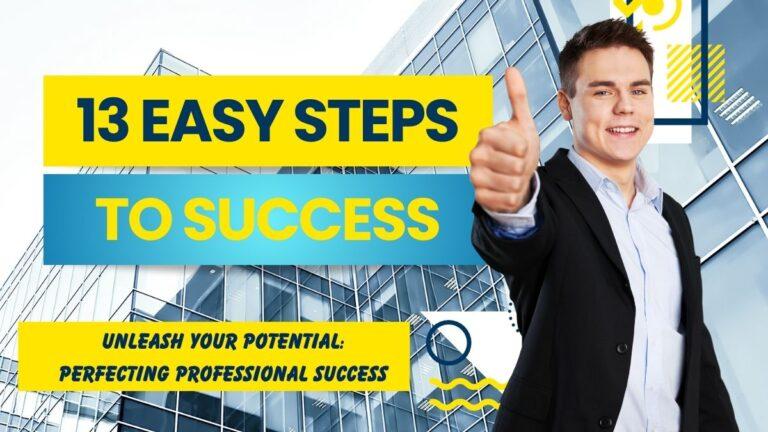Discover Your Dream Career: The Ultimate 7-Step Guide to Finding Your Perfect Path!
7 Proven Steps to Unveil Your Dream Career and Forge the Perfect Path
When it comes to the most impactful facets of life, I find that family, health, and work consistently stand out as the top priorities. Among these, I firmly believe that deciding on a specific career path will be one of the most pivotal choices I’ll ever make. The journey of selecting my career might span weeks, months, or even years as I dive deep into understanding my desires and requirements in a job.
This guide provides me with an all-encompassing list of potential activities that can guide me through the process of choosing my dream career. I fully recognize that the possibility of transitioning to a new career at various stages in my life underscores the significance of mastering this invaluable life skill.
How I Choose the Perfect path for My Dream Career?
To effectively navigate the labyrinth of career choices and uncover my true calling, I will incorporate the following activities into my decision-making process:
1. Conduct a Comprehensive Self-Assessment
Before I embark on any significant decision, I understand the importance of setting aside time for self-reflection. This practice holds true for career selection as well. During this phase, I will learn about the kind of work environment I thrive in, the nature of work that brings me joy, my preferred collaborators, and more. Documenting my reflections can serve as a valuable reference point as I assess job descriptions later on.
To get started, here are a few prompt questions that help me delve into self-assessment. I aim to note down my initial thoughts without dwelling on them for too long. Seeking guidance from trusted friends or family members if certain queries prove challenging to answer is a great strategy.
- What are my core values? (Example: Financial stability, altruism, independence)
- What soft skills do I excel in? (Example: Time management, communication, problem-solving.)
- What technical skills are in my toolkit? (Example: Data analytics, planning, research, multilingualism, photography.)
- What natural talents do I possess? (Example: Writing, leadership, sales, project management)
- What defines my personality? (Example: Myers-Briggs personality type: introverted, extroverted, confident)
- What subjects or domains pique my interest? (Example: Technology, writing, medicine, design)
2. Define My Non-Negotiables
Taking a dedicated moment to outline my non-negotiables in a job is a crucial step. These could span from financial aspects and travel commitments to benefits and geographical preferences. Revisiting the self-assessment phase while recording aspects that I can’t compromise on when shaping my career is essential.
- Is a specific salary a requirement for me?
- Do I need particular benefits, like specific healthcare coverage or a set amount of time off?
- Am I open to a job that entails travel?
- Do I have a specific location in mind for work?
- Is remote work flexibility essential for me?
- Am I committed to a particular job title or level?
- Are there tasks I either want to undertake or adamantly wish to avoid?
- Are there work environments in which I struggle to perform optimally?
Defining my job prerequisites in advance proves essential. For instance, if a consistent salary is paramount, freelancing might not be the best avenue. By establishing my non-negotiables, I can better evaluate potential career choices during the research phase.
Suggestion to Read: 6 Career Challenges faced by fresh Graduate
3. Curate a List of Promising Career Options
Once I’ve gained insights into my own persona and prerequisites, I’ll begin exploring and compiling a roster of intriguing career paths. Even if certain roles are unfamiliar, I’ll jot them down for future investigation. Sometimes, a lesser-known job could unexpectedly become my perfect fit. It’s important to remember that job titles don’t always encapsulate the full scope of a role. A title that appears unappealing may conceal a job description perfectly aligned with my strengths and interests. Here are some pointers for developing my career shortlist:
- Leveraging my network: Tapping into the experiences of friends and colleagues occupying roles that intrigue me could lead me to potential career paths worth considering. For example, if a friend holds an interesting job, I’ll ask them about their experiences and insights.
- Fascinating industries: Identifying industries that captivate me, such as design, fashion, business, or education, can guide me toward suitable jobs. If a specific industry aligns with my interests, I’ll explore job opportunities within it.
- Embracing my passions: Reflecting on tasks or activities I genuinely enjoy, such as crafting presentations or teamwork, will help me narrow down roles that align with my strengths. If I enjoy organizing information, I’ll seek out careers that involve this skill.
- Envisioning my goals and values: Contemplating where I see myself in two, five, and ten years can lead me to roles that align with my long-term aspirations. If I envision a specific title or level, I’ll consider careers that offer growth in that direction.
- Recognizing my strengths and talents: Acknowledging my areas of expertise, be they soft or hard skills, will help me find a career path poised for success. If I excel in communication and problem-solving, I’ll search for roles that value these skills.
Which Are The Best Career Options In India ?
Suggestions To Read: Achieve Your Dreams: Designing a Winning 5-Year Career Plan
Suggestions To Read-The Ultimate Career Guide: Full Stack Development and Part-Time Job Tips
4. Thorough Research and Selection
With a roster of potentially appealing careers at my disposal, I’ll initiate an in-depth exploration of each option. My goal is to narrow down my list to one or two career paths that genuinely excite me.
I’ll adopt the following strategy to conduct my research:
- A Day in the Life: Gaining a deeper understanding of a career’s compatibility by delving into its daily responsibilities will be crucial. Accessing sample job descriptions and familiarizing myself with typical tasks will be part of my research process.
- Compensation Insights: While a specific salary requirement may or may not be on my radar, acquainting myself with the average compensation within my chosen careers will provide valuable insights.
- Prerequisite Awareness: Ahead of committing to a career, acquainting myself with the certifications, degrees, training, or credentials it demands will help me refine my list to roles aligned with my qualifications.
- Scope for Advancement: Investigating the growth potential inherent in my preferred careers will be crucial. Examining opportunities for skill development, advancement, and increased responsibility by studying job descriptions will be a part of my research.
- Industry Outlook: Gauging my chosen job’s standing in the labour market, including hiring trends and projected job growth, will inform my decisions. I’ll prioritize careers showing consistent demand and expansion.
Once my shortlist has been refined to one or two options, I’ll assess whether additional training or credentials are necessary for entry. While certain employers offer on-the-job training, others seek candidates with established qualifications. Scrutinizing the job posting for precise requirements, especially in the “Requirements” and “Education and Experience” sections, will be crucial. If I meet the prerequisites for my chosen path towards my dream career, I’ll update my resume to highlight pertinent skills and strengths. Perusing job listings will help me understand the attributes that employers in my sector value.
Embarking on My Career Journey
Armed with my refined list and an enhanced resume, I’m poised to launch my job search towards my dream career.
I’ll begin by exploring opportunities on platforms like Indeed, apna, naukri, workindia portals, where I can apply filters to tailor my search parameters. Customizing factors such as job type, distance, and experience level will ensure I find the right fit.
As I transition into my new dream career, I’ll keep these insights in mind:
- Maximizing My First Year: Embracing the learning curve and seizing opportunities for growth in a new job will be essential. I’ll make the most of my initial year by absorbing new information, learning the industry, and establishing myself within the team.
- Staying Aligned with My Goals: Should I experience uncertainty or dissatisfaction with my career, revisiting my future objectives will guide me. If my current path diverges from my aspirations, I’ll consider shifting my tasks or exploring other roles that align better with my goals.
- Pursuing My Interests: Spending time developing and exploring tasks, activities, or roles I particularly enjoy will be a priority. Following what I enjoy and excel at will facilitate my career advancement and ensure I get the most out of my day-to-day role.
FREQUENTLY ASKED QUESTIONS (FAQ) FOR DREAM CAREER:
1. FAQ: What is the importance of self-assessment in choosing a career?
Self-assessment is crucial as it helps me understand my values, strengths, and interests, guiding me toward a career that aligns with who I am.
2. FAQ: How do I determine my non-negotiables in a job?
I define my non-negotiables by identifying aspects like salary, benefits, and work environment that I cannot compromise on, ensuring I make the right career choice.
3. FAQ: Can I explore industries I’m not familiar with during my career search?
Absolutely! Exploring unfamiliar industries broadens my horizons. A job title may not fully convey the role, so researching various industries helps me find unexpected career options.
4. FAQ: How do I assess the growth potential of a career path?
By studying job descriptions and industry trends, I can evaluate the opportunities for advancement, skill development, and long-term success in a chosen career.
5. FAQ: How can I make the most of my first year in a new career?
During the first year, I absorb information, learn industry nuances, and establish my presence. Embracing challenges and opportunities for growth sets a strong foundation for success.







